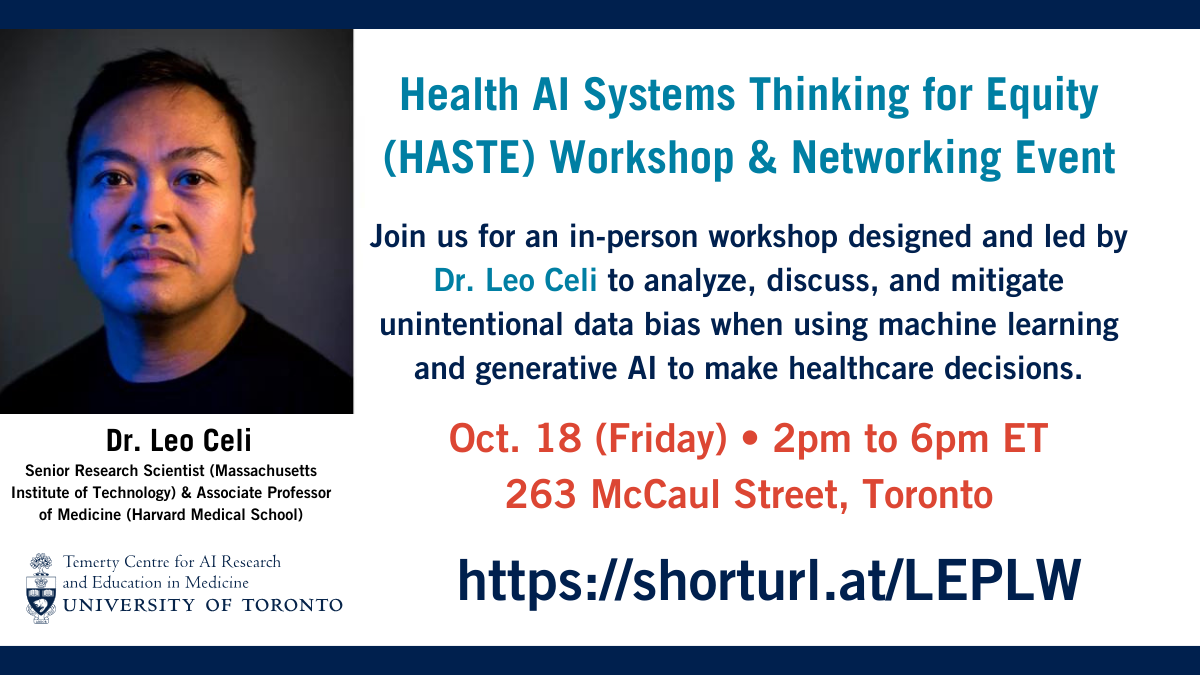Mobile Menu
- About Us
- Partnerships
- Events
- News
- Research
- Education
- Infrastructure
- Community

DATE: October 18, 2024 (Fri.)
WHERE: 263 McCaul Street, Toronto (Google map)
WHEN: 2pm to 6pm ET
METHOD: In-person only
ACCREDITATION: This event is CPD-accredited for physicians.
This event has taken place. We are leaving this information up for a short time for reference.
Join AI health enthusiasts for a Health AI Systems Thinking for Equity (HASTE) workshop with Dr. Leo Celi from MIT Critical Data. Dr. Celi developed this program to analyze, discuss, and mitigate unintentional data bias when using machine learning and generative AI to make healthcare decisions.
Dr. Celi has successfully held 10 HASTE workshops at various universities in the U.S. Participants will be divided into groups to analyze and discuss policies governing AI algorithms in medicine. It's a wonderful opportunity to learn from people with various backgrounds about the potential risks and rewards of AI health.
1pm to 2pm: Registration at 263 McCaul Street (College Street & McCaul Street), Toronto
2pm to 2:30pm: Introductory Remarks & Keynote Address by Dr. Leo Celi
2:30pm to 5pm: Workshop with participants
5pm to 6pm: Networking event
Food and light refreshments will be provided.
1. After active engagement in the workshop, participants will be able to collaborate with learners from among different disciplines and generations to enhance epistemic diversity.
2. After active engagement in the workshop, participants will understand and be able to analyze how artificial intelligence differs from previous health innovations with respect to its design, applications, and the rapid pace of development.
3. After active engagement in the workshops, participants will be able to evaluate the return on investment of artificial intelligence by comparing evidence of benefits against potential harms.
Leo Anthony Celi has practiced medicine on three continents, giving him broad perspectives on healthcare delivery. As clinical research director and principal research scientist at the MIT Laboratory of Computational Physiology (LCP), he brings together clinicians and data scientists to support research using data routinely collected in the intensive care unit (ICU). His group built and maintains the Medical Information Mart for Intensive Care (MIMIC) database. This public-access database has been meticulously de-identified and is freely shared online with the research community. It is an unparalleled research resource; over 2000 investigators from more than 30 countries have free access to the clinical data under a data use agreement. In 2016, LCP partnered with Philips eICU Research Institute to host the eICU database with more than 2 million ICU patients admitted across the United States. The goal is to scale the database globally and build an international collaborative research community around health data analytics.
Leo founded and co-directs Sana, a cross-disciplinary organization based at the Institute for Medical Engineering and Science at MIT, whose objective is to leverage information technology to improve health outcomes in low- and middle-income countries. At its core is an open-source mobile telehealth platform that allows for the capture, transmission and archiving of complex medical data (e.g. images, videos, physiologic signals such as ECG, EEG and oto-acoustic emission responses), in addition to patient demographic and clinical information. Sana is the inaugural recipient of both the mHealth (Mobile Health) Alliance Award from the United Nations Foundation and the Wireless Innovation Award from the Vodafone Foundation in 2010. The software has since been implemented around the globe, including India, Kenya, Lebanon, Haiti, Mongolia, Uganda, Brazil, Ethiopia, Argentina, and South Africa.
He is one of the course directors for HST.936—global health informatics to improve quality of care, and HST.953—secondary analysis of electronic health records, both at MIT. He is an editor of the textbook for each course, both released under an open-access license. The textbook Secondary Analysis of Electronic Health Records came out in October 2016 and was downloaded over 48,000 times in the first two months of publication. The course “Global Health Informatics to Improve Quality of Care” was launched under MITx in February 2017.
Leo was featured as a designer in the Smithsonian Museum National Design Triennial “Why Design Now?” held at the Cooper-Hewitt Museum in New York City in 2010 for his work in global health informatics. He was also selected as one of 12 external reviewers for the National Academy of Medicine 2014 report “Investing in Global Health Systems: Sustaining gains, transforming lives”.
